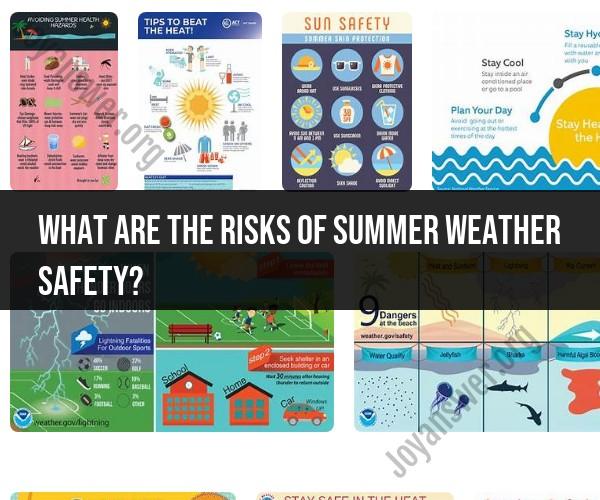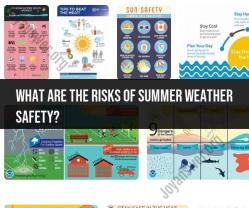What are the risks of summer weather safety?
Summer weather safety concerns can vary depending on your location and the specific weather conditions you experience. However, some common risks associated with summer weather safety include:
Heat-Related Illnesses:
- Heat exhaustion and heatstroke are common concerns during hot summer months. Prolonged exposure to high temperatures can lead to dehydration, dizziness, nausea, and, in severe cases, heatstroke, which is a life-threatening condition.
Sunburn and Skin Cancer:
- Overexposure to the sun's harmful ultraviolet (UV) rays can cause sunburn and increase the risk of skin cancer. It's essential to use sunscreen, wear protective clothing, and seek shade to reduce these risks.
Air Quality and Allergies:
- Summer can bring poor air quality, especially in urban areas, due to smog and pollutants. Additionally, high pollen counts during summer can trigger allergies and respiratory issues.
Thunderstorms and Lightning:
- Thunderstorms can bring heavy rain, strong winds, lightning, and flash floods. Lightning poses a risk to outdoor activities and can cause fires and power outages.
Tornadoes and Severe Weather:
- Some regions experience tornadoes and severe weather during the summer, which can result in property damage, injuries, and even fatalities.
Drowning and Water Safety:
- Increased outdoor activities near water, such as swimming and boating, can lead to a higher risk of drowning accidents. It's crucial to follow water safety guidelines and supervise children near water.
Insect-Borne Diseases:
- Warmer weather can lead to an increase in insects like mosquitoes and ticks, which can transmit diseases such as West Nile virus, Lyme disease, and Zika virus. Use insect repellent and take preventive measures.
Foodborne Illnesses:
- Picnics and outdoor gatherings in hot weather can lead to foodborne illnesses if proper food handling and storage practices are not followed.
Dehydration and Hydration Issues:
- In hot weather, it's easy to become dehydrated, which can lead to health problems. Staying hydrated is crucial, especially during outdoor activities.
Wildfires:
- Some regions are prone to wildfires during dry and hot summer months. Wildfires can pose a significant risk to both property and lives.
Extreme Weather Events:
- Unpredictable extreme weather events, like hurricanes or tropical storms, can occur during the summer, leading to flooding, wind damage, and power outages.
Overexertion and Exercise-Related Injuries:
- Overexertion during outdoor sports and physical activities can lead to injuries, such as sprains, strains, and heat-related problems.
To stay safe during the summer, it's essential to be aware of these potential risks and take appropriate precautions. This includes staying informed about weather forecasts and warnings, wearing appropriate clothing and protective gear, staying hydrated, and following safety guidelines for outdoor activities. Always exercise caution and prioritize your health and safety during the summer months.
What are the potential risks associated with summer weather safety?
Summer weather can be dangerous, especially if you are not prepared. Some of the potential risks associated with summer weather safety include:
- Heat-related illnesses: Heat-related illnesses, such as heatstroke and heat exhaustion, can occur when your body is unable to cool itself properly. Heat-related illnesses can be serious and even fatal if not treated promptly.
- Sunburn: Sunburn is a painful and potentially dangerous condition caused by overexposure to the sun's ultraviolet (UV) rays. Sunburn can increase your risk of developing skin cancer.
- Dehydration: Dehydration is a condition that occurs when you do not drink enough fluids to replace the fluids that your body loses through sweating and other bodily functions. Dehydration can lead to fatigue, dizziness, and other health problems.
- Drowning: Drowning is a leading cause of accidental death in children and adults. It is important to take precautions to prevent drowning, such as swimming in supervised areas and wearing a life jacket.
- Lightning strikes: Lightning strikes can be deadly. It is important to take precautions to stay safe during thunderstorms, such as avoiding outdoor activities and taking shelter in a sturdy building.
How to stay safe during hot weather and prevent heat-related illnesses?
There are a number of things you can do to stay safe during hot weather and prevent heat-related illnesses, such as:
- Stay hydrated: Drink plenty of fluids, even if you don't feel thirsty. Water is the best choice, but you can also drink sports drinks or electrolyte-rich beverages.
- Avoid strenuous activity during the hottest part of the day: If you must be active, try to do your activities in the morning or evening when it is cooler.
- Wear loose-fitting, light-colored clothing: This will help you stay cool and comfortable.
- Seek shade when possible: Avoid standing or sitting in direct sunlight for extended periods of time.
- Take breaks from the heat: If you start to feel hot and tired, take a break in a cool place.
What are the dangers of extreme heat, sun exposure, and dehydration in the summer?
Extreme heat, sun exposure, and dehydration can all be dangerous, especially in the summer.
Extreme heat can lead to heat-related illnesses, such as heatstroke and heat exhaustion. Heatstroke is a life-threatening condition that occurs when your body temperature rises to 103 degrees Fahrenheit (39.4 degrees Celsius) or higher. Heat exhaustion is a less severe form of heat illness, but it can still be serious.
Sun exposure can lead to sunburn, skin cancer, and premature aging. Sunburn is a painful and potentially dangerous condition that can increase your risk of developing skin cancer. Skin cancer is the most common type of cancer in the United States.
Dehydration can lead to fatigue, dizziness, headache, and other health problems. In severe cases, dehydration can lead to seizures and coma.
How to recognize the signs of heatstroke and sunburn?
The signs of heatstroke include:
- High body temperature (103 degrees Fahrenheit or higher)
- Red, hot, and dry skin
- Rapid pulse
- Headache
- Dizziness
- Confusion
- Nausea and vomiting
The signs of sunburn include:
- Red, painful skin
- Blisters
- Swelling
- Fever
- Chills
If you see any of the signs of heatstroke or sunburn, seek medical attention immediately.
What safety measures should you take during summer outdoor activities?
Here are some safety measures you should take during summer outdoor activities:
- Wear sunscreen with an SPF of 30 or higher and reapply it every two hours, or more often if you are sweating or swimming.
- Wear a hat and sunglasses to protect your face and eyes from the sun.
- Drink plenty of fluids, even if you don't feel thirsty.
- Take breaks in the shade to cool down.
- Be aware of the weather conditions and avoid strenuous activity during the hottest part of the day.
- If you are swimming, swim in supervised areas and wear a life jacket.
By following these safety measures, you can help to stay safe and enjoy your summer activities.


